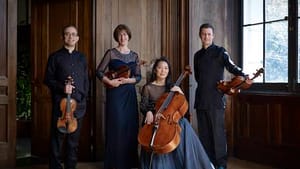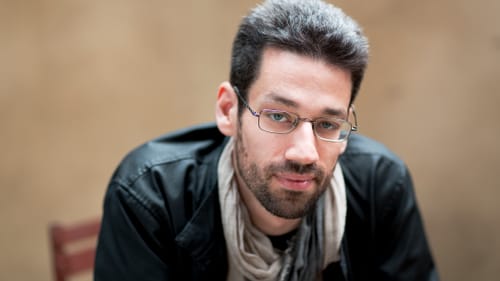Stay in the Loop
BSR publishes on a weekly schedule, with an email newsletter every Wednesday and Thursday morning. There’s no paywall, and subscribing is always free.
Czech? Please!
PCMS presents the Brentano Quartet with Jonathan Biss, piano

Pianist Jonathan Biss joined the Brentano String Quartet for an all-Czech recital at Philadelphia Chamber Music Society (PCMS) this week. The expansive program, featuring selections by Antonín Dvořák, Leoš Janáček, and Bedřich Smetana, highlighted the development of a distinctly Slavic sound around the turn of the last century, and how that unique style rightly earned a place at the forefront of classical music.
Eastern European composers have always shown interest in fusing their native folk traditions to accepted Western styles. The defining characteristics of Czech compositions — alternating major and minor keys, uncomplicated structures, and a balance between musical heroism and simple melody — lend themselves particularly well to chamber music. Brentano’s spirited program emerged as a major success.
Restrained yet resonant
Although this listener would easily identify Janáček as his favorite Czech composer, Dvořák (1841-1904) carried the day here. The program expertly showed off his vast and varied contributions to musical literature, beginning with his Two Slavonic Dances in an arrangement by Brentano violist Misha Amory.
Amory, along with violinists Mark Steinberg and Serena Canin, with cellist Nina Lee, created a lean, nimble sound in the opening Slavonic Dance in C Major, Op. 46, No. 1. Biss, who can be exceptionally expressive at the keyboard, restrained his sound to complement the quartet’s playing.
At times, Biss seemed to barely strike the keys, yet his notes emerged with just the right amount of resonance. The overall effect was that of a country dance, which contrasted nicely with the Romantic influence of the Slavonic Dance in E Minor, Op. 72, No. 2.
Steinberg, Canin, and Amory offered an arresting reading of the composer’s Miniatures for Two Violins and Viola, Op. 75a, with silken, intricately woven textures and flawless legato lines. Dvořák’s personal skill as a violinist shines through in his writing for the instrument, particularly the haunting quality of the piece’s opening cavatina and the playful pizzicato that concludes the third miniature. Though Dvořák was Catholic, you can almost hear the influence of Jewish folk music in the wailing riffs of the closing "Elegie," soulfully intoned by Steinberg.

A spiritual grandfather
Dvořák’s massive Piano Quintet in A Major, Op. 81, closed the program, which Brentano and Biss dispatched fleetly, with explosive melodies. Biss is no stranger to the piece — he recorded it in 2012 with the Elias String Quartet — and his authority was evident throughout.
He joined beautifully with Lee for the meltingly slow opening "Allegro," segueing effortlessly into the hard-driving rhythms that pulse throughout the piece. As with the Slavonic Dances, which benefit from both Czech traditions and European classical expectations, the piece balances light and dark, dance and drama. Brentano and their pianist captured all the colors.
Between the Dvořák selections, Biss had a solo moment to shine in selections from Janáček’s On the Overgrown Path. He contrasted the gentle harmony in “Our Evenings,” the opening piece, with the composer’s jarring interruptions. His intonation seemed oddly imprecise in “Words Fail!” but he recovered nicely with the final Janáček selection, “Good Night!” Freed from the need for collaborative spirit, Biss unleashed the full musicality of his playing style.
Biss and Steinberg captured the wonderful simplicity of Smetana’s “Aus der Heimat” (“From My Homeland”), perhaps the most purely representative example of a Czech folk style.
Smetana is likely best remembered today for his comic operetta The Bartered Bride. When performed outside the Czech Republic, this operetta is often given in an English or German translation. But Smetana left behind many wonderful chamber pieces and serves as the spiritual grandfather for composers like Janáček and Dvořák.
What, When, Where
Brentano String Quartet. Jonathan Biss, piano. All Czech recital featuring selections by Antonín Dvořák, Leoš Janáček, and Bedřich Smetana. Philadelphia Chamber Music Society. October 23, 2018, at the Kimmel Center’s Perelman Theater, 300 S. Broad Street, Philadelphia. (215) 569-8080 or pcmsconcerts.org.
Sign up for our newsletter
All of the week's new articles, all in one place. Sign up for the free weekly BSR newsletters, and don't miss a conversation.

 Cameron Kelsall
Cameron Kelsall